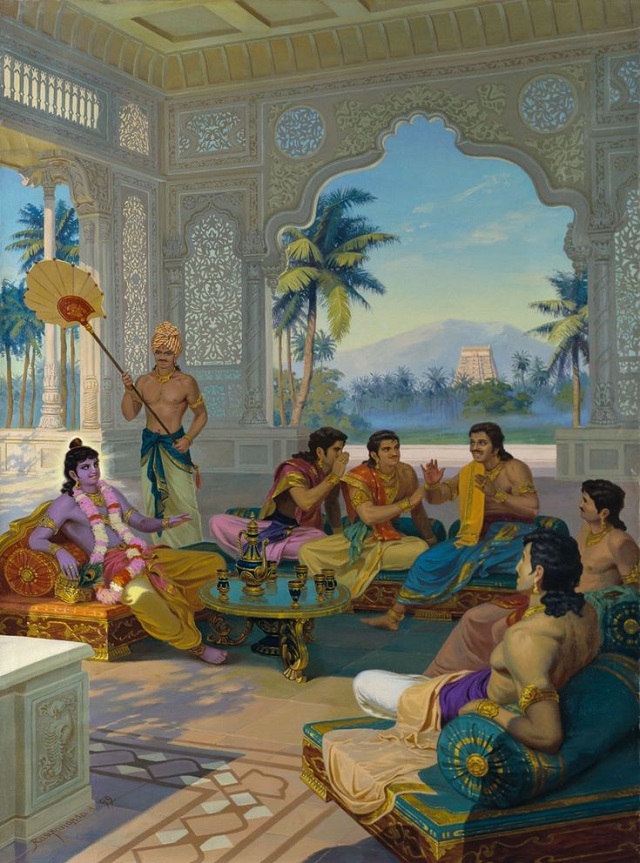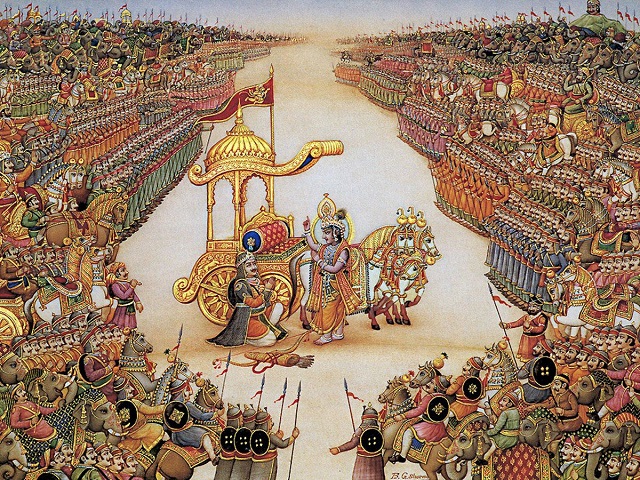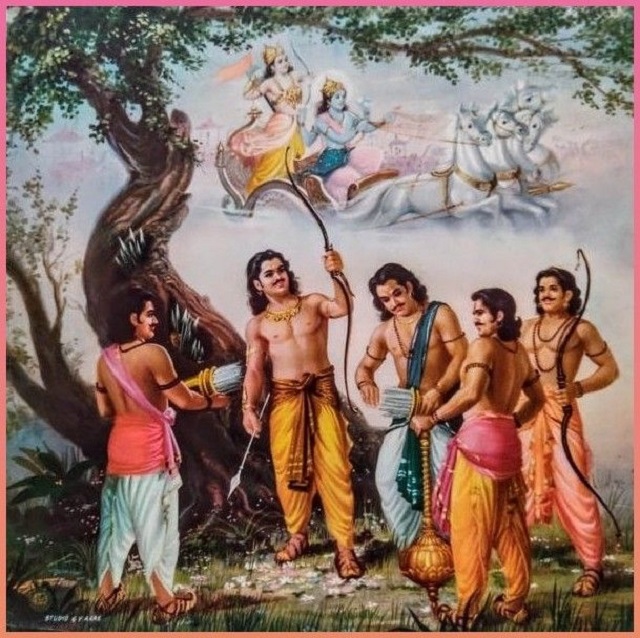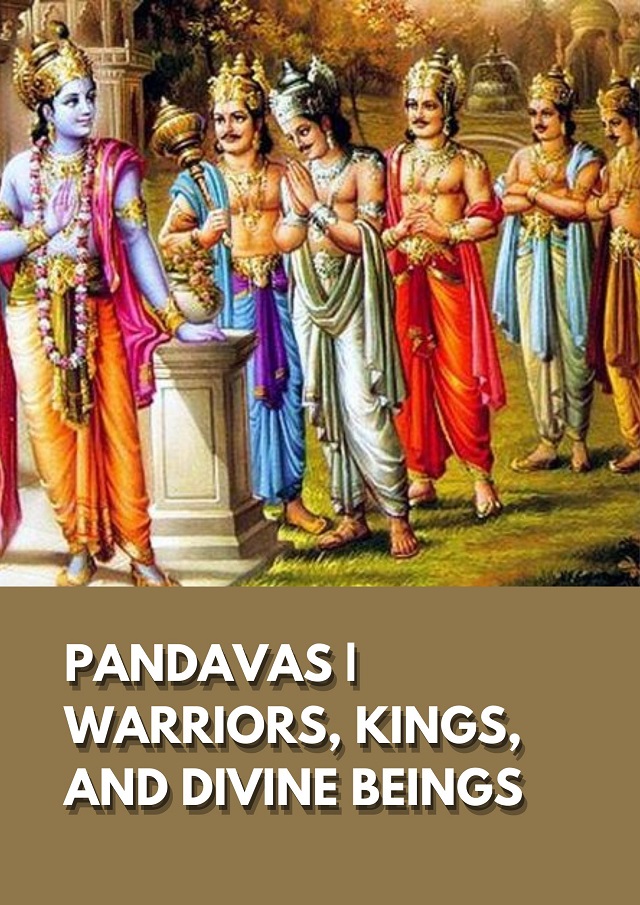The Pandavas are a group of five brothers who feature prominently in the ancient Indian epic Mahabharatham. The eldest brother, Yudhishthira, was known for his honesty and sense of justice. The second brother, Bhima, was known for his great strength and courage in battle. Arjuna, the third brother, was a skilled warrior and archer said to be favored by the gods.
The younger brothers, Nakula and Sahadeva, were known for their beauty and knowledge of medicine and horses, respectively. The story of the Pandavas is a tale of family, honor, and duty. Despite facing many trials and tribulations, they remained committed to their principles and each other. Their story has been retold and adapted in many different forms over the centuries.

At the same time, their legacy continues to inspire people worldwide. The story of the Pandavas is one of the most famous and enduring tales in Indian mythology. It is a story of family, duty, and sacrifice and continues to captivate audiences worldwide.
Origins of the Pandavas
The Pandavas are five brothers born to Queen Kunti, the wife of King Pandu, in the ancient Indian epic Mahabharatham. They are the five sons of King Pandu and are often considered to be the heroes of the story. The story of the Pandavas begins with their father, King Pandu, who was cursed to die if he ever engaged in sexual activity. As a result, he could not have children with his two wives, Kunti and Madri.
Kunti had received a boon from the god Dharma, which allowed her to call upon any god and have a child with them. She used this boon to have Yudhishthira with the god Yama, Bhima with Vayu, and Arjuna with Indra. Later, Madri, the second wife of King Pandu, had Nakula and Sahadeva with the twin gods Ashwin.
The Pandavas grew up in the forest with their mother and were trained in various skills by their parents and other teachers. After the death of King Pandu, his brother Dhritarashtra became the king. Additionally, his son Duryodhana became the heir to the throne. The Pandavas and Kauravas (Duryodhana’s brothers) grew up together but were always at odds.
The upbringing of the Pandavas
The Pandavas had a unique upbringing, having been raised in the forest by their mother, Kunti, and their father, Pandu before he died. They were taught various skills and were trained in weaponry by multiple gurus. Bhishma, the grandfather of the Pandavas, also played a significant role in their upbringing and education.
Yudhishthira, the eldest brother, was known for his wisdom and sense of justice. Bhima, the second brother, was taught the art of wrestling and was known for his physical strength. Arjuna, the third brother, was trained in archery by Indra. He was said to be the greatest archer of his time.
The younger brothers, Nakula and Sahadeva, were introduced to horse riding, medicine, and politics. Despite their different skills, the Pandavas shared a strong bond of brotherhood and were always there for each other.
The Kurukshetra War
The Kurukshetra War is a famous battle in the Indian epic Mahabharatham, fought between the Pandavas and the Kauravas. The war lasted for eighteen days and was fought on the battlefield of Kurukshetra. It was a culmination of years of tension and conflict between the two families vying for the throne of Hastinapur.
Various allies, including Lord Krishna, assisted the Pandavas. At the same time, the Kauravas had a larger army and were supported by powerful warriors such as Bhishma and Dronacharya. The intense battle resulted in the deaths of many great warriors, including Bhishma, Dronacharya, and Karna.

Ultimately, the Pandavas emerged victorious and established Yudhishthira as the king of Hastinapur. The Kurukshetra War is considered a turning point in Indian history. Generally has been the subject of many retellings and adaptations in various forms of media.
The Pandavas in Battle
The Pandavas were skilled warriors who were pivotal in the Kurukshetra War. Yudhishthira, the eldest brother, was known for his wisdom and strategy. Bhima, the second brother, was renowned for his strength and bravery in battle. Arjuna, the third brother, was a skilled archer who received divine weapons from the gods.
The younger brothers, Nakula and Sahadeva, were professional fighters with unique strengths. Throughout the war, the Pandavas faced many challenges and obstacles. They fought bravely against the Kauravas and their allies, and their determination and perseverance helped them to emerge victorious. Arjuna’s famous dialogue with Lord Krishna is known as the Bhagavad Gita.
It has become a famous philosophical treatise on the nature of duty, responsibility, and the meaning of life. The Pandavas’ victory in the Kurukshetra War cemented their place in Indian mythology. Meanwhile making them an enduring symbol of bravery and heroism.
Victory and Loss
The victory of the Pandavas in the Kurukshetra War came at a great cost. Although they had emerged victorious, they had also suffered significant losses. Many of their close friends and family members had died in battle, including Abhimanyu, Arjuna’s son, and Ghatotkacha, Bhima’s son. The war had also taken a toll on the Pandavas physically and emotionally.
Despite their losses, the Pandavas remained steadfast in their sense of duty and responsibility. They worked hard to rebuild their kingdom and establish a prosperous rule. Yudhishthira, in particular, was known for his wisdom and fairness as a king. The Pandavas’ victory in the Kurukshetra War had far-reaching implications for Indian history and culture.
Especially their story continues to inspire people worldwide. While their victory was not without its losses, it served as a testament to the power of perseverance, courage, and brotherhood in the face of adversity.
The Pandavas: A Story of Family and Duty
The story of the Pandavas is a captivating tale of family and duty. The bonds of brotherhood and the weight of responsibility are at the heart of the narrative. Simultaneously throughout their journey, the Pandavas are constantly tested and challenged, individually and as a group. They navigate the complexities of family dynamics and the demands of their roles as warriors, leaders, and sons.
Sibling Bonds and Maternal Influence: The Family Dynamics of the Pandavas
The family dynamics of the Pandavas are central to the story. Meanwhile, with their relationships with each other and their mother, Kunti shapes their identities and actions. As brothers, the Pandavas share a deep bond that is repeatedly tested by the trials they face.
Kunti, their mother, is a complicated figure with a complex relationship with her children due to the circumstances of their birth. Her influence on the Pandavas is significant in their upbringing and decisions throughout the story.
Overlooked Influence: King Pandu’s Role in the Upbringing of the Pandavas
King Pandu’s role in the upbringing of the Pandavas is often overlooked, but his influence on his sons is profound. As a skilled warrior and strategist, he instilled a sense of duty and responsibility to guide them throughout their lives.
Despite his early death, his legacy lives on in the actions and decisions of his sons. At the same time, his absence sets in motion a chain of events that would ultimately lead to the Kurukshetra War.
A Tragic Curse: The Story of King Pandu’s Infertility
King Pandu’s infertility is a significant part of the Pandavas’ story, with its tragic implications shaping the narrative profoundly. His curse, which he received due to a sad incident, leaves him unable to produce an heir and sets in motion a series of events that would have significant consequences for his family and his kingdom.
Discrimination and Mistreatment from the Kauravas
The Pandavas face discrimination and mistreatment from the Kauravas throughout their lives while stemming from the Kauravas’ jealousy and envy towards their cousins. The mistreatment ranges from attempts on their lives to outright exclusion from their rightful inheritance and status as kingdom princes.
The Kauravas’ Jealousy and Envy: The Roots of Conflict
The roots of the conflict between the Pandavas and the Kauravas lie in the latter’s jealousy and envy towards their cousins. The Kauravas feel threatened by the Pandavas’ strength, intelligence, and popularity, leading them to engage in a pattern of mistreatment and discrimination that eventually culminates in the Kurukshetra War.
The Pandavas’ Struggles: Discrimination and Exile
The Pandavas face significant struggles throughout their lives due to the mistreatment and discrimination they experience from the Kauravas. Their exile into the forest, which lasts for thirteen years, is a particularly challenging period during which they face numerous obstacles and dangers.
The Role of Vidura and Bhishma in Supporting the Pandavas
Despite the mistreatment and discrimination faced by the Pandavas from the Kauravas, they receive support and guidance from several key figures in the story, including Vidura and Bhishma. Vidura, the half-brother of Dhritarashtra, serves as a wise and loyal advisor to the Pandavas throughout their struggles.
At the same time, Bhishma, the patriarch of the Kuru family, provides moral support and guidance, even if he cannot actively intervene on their behalf. Their roles are crucial in ensuring the Pandavas are not alone in their struggle against the Kauravas.
The Battle Lines Drawn: The Pandavas vs. the Kauravas
The battle lines are drawn in the Kurukshetra War, with the Pandavas and their allies on one side and the Kauravas and their supporters on the other. The stakes are high, and both sides are prepared to fight to the death and emerge victorious.
The Epic War: Strategies, Tactics, and Battles
The Kurukshetra War is an epic conflict that involves numerous battles, strategies, and tactics. Both sides employ various methods to gain an advantage, including chariots, weapons, and magic. The war is intense and brutal, with significant losses on both sides.
Bravery and Skill on the Battlefield
The Kurukshetra War is a testament to the bravery and skill of the warriors on both sides. Likewise, throughout the conflict, many individuals demonstrate exceptional courage, strength, and cunning in their efforts to gain the upper hand and secure victory.

Yudhishthira: Wisdom and Righteousness on the Battlefield
Yudhishthira is known for his wisdom and righteousness, even on the battlefield. He is a skilled strategist and tactician who employs his intellect to gain an advantage over the enemy. Despite the violence and chaos of war, he maintains his moral compass and never wavers from his commitment to righteousness.
Bhima: The Strongman of the Pandavas
Bhima is the strongman of the Pandavas, at the same time he is known for his immense strength and ferocity in battle. He is a formidable opponent who strikes fear into the hearts of his enemies. Despite his brutal nature, he is a loyal and devoted brother who will do whatever it takes to protect his family and ensure their victory.
Arjuna: The Favorite Disciple of Drona
Arjuna is the favorite disciple of Drona, a renowned warrior, and teacher. He is a skilled archer and warrior with physical and mental strength. Throughout the Kurukshetra War, he faces numerous challenges and obstacles, but his determination and skill enable him to overcome them and emerge victorious.
Nakula and Sahadeva: The Skilled Horse-Riders and Hunters
Nakula and Sahadeva are skilled horse riders and hunters who play important roles in the Kurukshetra War. Especially they are expert marksmen who employ their skills to great effect on the battlefield. Despite their less prominent roles, their contributions to the Pandava cause are significant and essential.
Conclusion: The Legacy of the Pandavas in Indian Mythology
The Pandavas’ story is a tale of bravery and heroism. Moreover reflects the complex human emotions and relationships that underlie our lives. Their struggles with jealousy, betrayal, and loss are all too familiar to us. At the same time, their triumphs remind us that perseverance and determination can overcome even the greatest challenges.
Especially the legacy of the Pandavas continues to be felt in Indian culture and society. Their story symbolizes brotherhood, loyalty, and sacrifice, and their example continues to inspire people today. The Pandavas may have been fictional characters, but their impact on Indian culture and mythology is real. E their story will continue to be retold and celebrated for generations. For more articles click here 21Hashtags.
